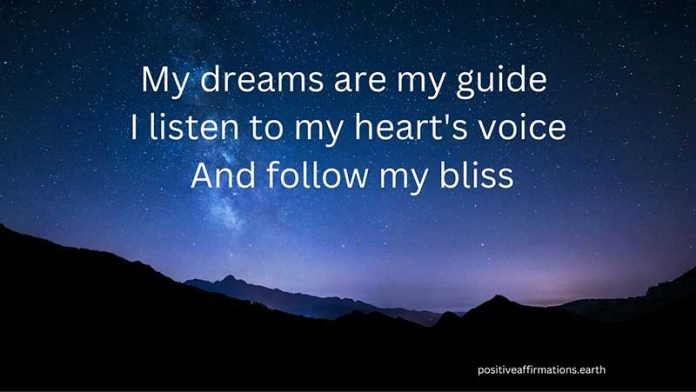The famous quote by Joseph Campbell, “Follow your bliss and the universe will open doors where there were only walls,” perfectly encapsulates the essence of our essay’s affirmation, “My dreams are my guide, I listen to my heart’s voice, and follow my bliss” (New World Library, 2004). This sentiment resonates deeply within the human psyche, urging us to live authentically by following our heart and achieving our dreams. This essay will explore the importance of dreams as a guide, the need to listen to the heart’s voice, and the joy of following one’s bliss.
Dreams as Guides
Dreams have been a fundamental part of human existence and exploration since time immemorial. Psychoanalyst Carl Jung saw dreams as a way to communicate with our unconscious and access insights about our deepest desires and fears (Jung, 1964). This concept aligns with the idea that dreams can guide our paths, providing a map for navigating the complexities of our lives.
Many influential figures have achieved great things by following their dreams. For instance, Martin Luther King Jr’s iconic “I Have a Dream” speech galvanized a movement for civil rights, turning a dream into reality (The King Institute, 2020). Similarly, Elon Musk’s dream of colonizing Mars has led to significant advancements in space technology through his company, SpaceX (Wall, 2023). These examples illustrate that dreams can act as powerful motivators and guides, enabling us to push boundaries and achieve unprecedented feats.
Listening to the Heart’s Voice
Listening to the heart’s voice is a metaphor for self-intuition and emotional intelligence. It is about recognizing and valuing our feelings and instincts. Daniel Goleman, the author of “Emotional Intelligence,” suggests that our emotions can guide our decision-making processes, influencing our choices and behaviors (Goleman, 1995). In essence, the heart’s voice is an inner compass, directing us towards what truly matters in our lives.
Moreover, research in the field of neuroscience has shown that the heart communicates with the brain in ways that significantly affect how we perceive and react to the world (HeartMath Institute, 2019). This heart-brain connection offers a physiological basis for the concept of the heart’s voice, providing a tangible framework for our understanding.
Following One’s Bliss
The concept of “following your bliss” was popularized by Joseph Campbell, who argued that individuals should seek what truly gives them joy and satisfaction (Campbell, 1988). Bliss can be seen as a deeply personal and subjective experience, a state of complete happiness, joy, and fulfillment.
Psychologist Mihaly Csikszentmihalyi’s concept of ‘flow’ aligns with the idea of following one’s bliss. ‘Flow’ is described as the state in which people are so involved in an activity that nothing else seems to matter; this is the ultimate expression of following one’s bliss (Csikszentmihalyi, 1990). Such a state, according to Csikszentmihalyi, not only makes our lives meaningful but also makes us happy and intrinsically motivated.
Conclusion
The affirmation, “My dreams are my guide, I listen to my heart’s voice, and follow my bliss,” urges us to be true to ourselves, to listen to our instincts, and to pursue what brings us joy. It is a reminder of the immense possibilities that unfold when we dare to dream, listen to our hearts, and follow our bliss. While this path may not always be easy, the rewards of living an authentic and fulfilling life make the journey worthwhile.
References:
- Campbell, J. (1988). The Power of Myth. New York: Anchor Books.
- Csikszentmihalyi, M. (1990). Flow: The Psychology of Optimal Experience. New York: Harper & Row.
- Goleman, D. (1995). Emotional Intelligence. New York: Bantam Books.
- HeartMath Institute. (2019). Science of the Heart. Retrieved from https://www.heartmath.org/research/science-of-the-heart/
- Jung, C. (1964). Man and His Symbols. New York: Doubleday.
- The King Institute. (2020). “I Have a Dream” speech. Retrieved from https://kinginstitute.stanford.edu/king-papers/documents/i-have-dream-address-delivered-march-washington-jobs-and-freedom
- Wall, M. (2023). SpaceX’s Starship: How Elon Musk Sees His Goals of Mars. Retrieved from https://www.space.com/news/mars-colony-spacex-elon-musk
- New World Library. (2004). Pathways to Bliss: Mythology and Personal Transformation. Retrieved from https://www.newworldlibrary.com/Books/ProductDetails/tabid/64/SKU/14509/Default.aspx#.YBb5Y-hKiUk



